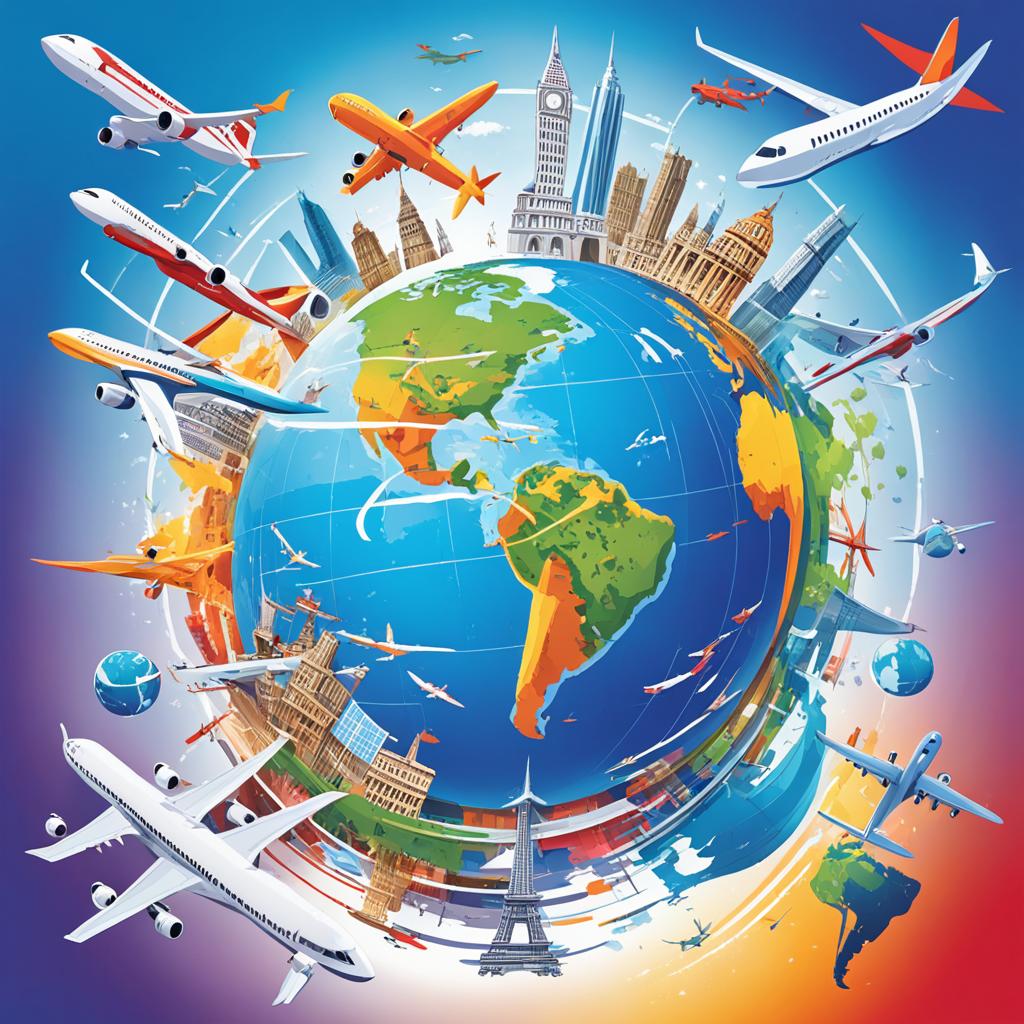Globalization, the intensification and expansion of worldwide economic, cultural, political, and technological exchanges and connections, has had a profound impact on various aspects of our lives. But have you ever wondered how it is shaping the tourism and hospitality industry? How is it influencing travel trends and the expectations of customers like you? Let’s dive deeper into this fascinating topic and uncover the dynamic effects of globalization in the realm of travel.
As the world becomes increasingly interconnected, the tourism and hospitality industry has experienced significant changes driven by globalization. From the emergence of new destinations to the evolution of customer preferences, these shifts have revolutionized the way we experience travel. Join us as we explore the impact of globalization on this ever-evolving industry and uncover possible challenges and opportunities along the way.
Global Mobility and Ease of Travel

The advancements in transportation have revolutionized global mobility and made travel more convenient than ever before. Modern aircraft, cruise ships, and fast trains have greatly contributed to the ease of travel, allowing people to move quickly and affordably to their desired destinations. Whether you’re exploring new cities or relaxing on a tropical island, transportation options provide the means to embark on your travel adventures.
The availability of international banking systems and multinational corporations offering travel bookings has further enhanced the convenience of travel. With just a few clicks, you can book flights, accommodations, and activities, all from the comfort of your own home. Additionally, the use of mobile devices for navigation and communication has made traveling seamless, ensuring you can easily find your way around unfamiliar places and stay connected with loved ones.
While global mobility and ease of travel have brought countless benefits, it’s important to acknowledge the challenges that have emerged. The COVID-19 pandemic, for example, has highlighted the need for strict measures to contain the spread of viruses during travel. Health screenings, quarantine protocols, and travel restrictions have become essential safeguards to protect travelers and communities.
| Advantages | Disadvantages |
|---|---|
|
|
Despite these challenges, the advancements in transportation and travel convenience have undoubtedly made exploring the world more accessible and exciting. Whether you’re embarking on a solo adventure or planning a family vacation, global mobility and ease of travel offer endless possibilities to create unforgettable memories.
Population and Demographic Trends

Globalization has had a significant impact on population and demographic trends, shaping the future of our global workforce and highlighting the challenges posed by an aging population. By 2050, the world population is projected to reach a staggering 9.7 billion, with varying growth rates across developed and developing nations.
In developed countries, the percentage of people over the age of 65 is expected to reach 25% by 2050. This demographic shift has significant implications for social services, healthcare systems, and the overall economy. As the global workforce continues to age, businesses and industries must adapt to cater to the needs and preferences of different age groups.
On the other hand, developing countries, particularly those in Sub-Saharan Africa, will contribute significantly to global population growth. This presents both opportunities and challenges for the tourism industry. As more people from developing nations enter the middle class and have the means to travel, there will be an increased demand for tourism services and experiences.
The tourism industry must be prepared to cater to the diverse needs and cultural backgrounds of this growing global population. Adapting to demographic changes is crucial for businesses to thrive in an increasingly interconnected and diverse world.
The Impact of Aging Population on the Tourism Industry
As the global population ages, the tourism industry must address the unique needs and preferences of older travelers. This demographic shift presents both challenges and opportunities for the industry. Older travelers may have different travel motivations, seek more accessible accommodations and experiences, and have specific health and safety concerns.
Moreover, the aging population also necessitates the provision of specialized social and health services for travelers. Destinations and businesses that prioritize accessibility, inclusivity, and senior-friendly amenities will be better positioned to tap into this growing market segment.
Catering to Diverse Age Groups and Cultural Backgrounds
The demographic changes brought about by globalization require the tourism industry to cater to diverse age groups and cultural backgrounds. Travelers today seek authentic and immersive cultural experiences, emphasizing the importance of inclusivity and respect for different traditions and customs.
In order to remain competitive, businesses and destinations must develop strategies to attract and engage travelers from different age groups and cultural backgrounds. This may involve offering tailored packages and experiences, providing multilingual services, and promoting cultural exchange programs.
By embracing the diversity and demographic changes, the tourism industry can foster greater understanding and appreciation between people from various countries and backgrounds.
Terrorism, Safety, and Security
Globalization has significantly impacted terrorism, safety, and security concerns in the tourism industry. While it has opened up new travel opportunities, it has also heightened the risks associated with terrorism and safety for travelers.
Terrorist attacks and political unrest have the potential to disrupt tourism in affected regions, leading to a decline in visitor numbers and economic losses. The interconnectedness of the world through globalization has made it easier for terrorist groups to spread their messages and ideologies, posing a threat to the safety of travelers.
In addition to the threat of terrorism, the ease of travel and movement facilitated by globalization has also made it easier for weapons and criminals to cross international borders undetected. This has increased the demand for enhanced safety and security measures to protect tourists and maintain the reputation and viability of tourist destinations.
Governments play a crucial role in promoting safety and security in the tourism industry by issuing travel advisories to their citizens. These advisories provide information and warnings about potential risks and security concerns in specific destinations. Travelers often rely on these advisories to make informed decisions about their travel plans, which can impact the choice of tourist destinations.
Ensuring the safety and security of tourists has become a top priority for the tourism industry. From increased security measures at airports and hotels to the implementation of surveillance technologies, destinations are taking steps to create a secure environment for visitors. Collaboration between governments, law enforcement agencies, and the tourism industry is essential to effectively address the challenges posed by terrorism and enhance overall safety and security.
By prioritizing safety, tourism stakeholders can not only attract more tourists but also build trust and confidence among potential visitors. This is particularly important in a world where globalization has made the exchange of information about safety and security concerns more accessible and influential.
Increased Awareness of New Destinations
Globalization has revolutionized the way we perceive and explore the world. With the increasing interconnectedness of people and cultures, there has been a significant rise in destination awareness, offering travelers a plethora of options to choose from. The circulation of information through various mediums like travel shows, films, and social media has played a pivotal role in expanding people’s knowledge of various destinations, their unique attributes, and the incredible experiences they offer.
This increased awareness has enabled travelers like you to make informed decisions about where to go and what to explore. From vibrant cities to breathtaking natural landscapes, the possibilities are endless. Whether you’re looking for a relaxing beach getaway, a thrilling adventure, or an immersive cultural experience, globalization has made it easier than ever to find the perfect destination that aligns with your interests and preferences.
Travel marketing has also evolved to capitalize on this increased awareness. Destinations around the world are competing intensely to attract visitors, showcasing their unique offerings and highlighting the experiences they offer. Travel agencies, online platforms, and social media influencers are actively promoting destinations, inspiring and influencing travelers like you to embark on new adventures and discover the wonders of the world.
One of the most exciting aspects of this increased destination awareness is the opportunity to explore lesser-known places. While popular tourist hotspots continue to draw crowds, globalization has opened doors to hidden gems. With a little research and a sense of adventure, you can uncover destinations that are off the beaten path, allowing you to experience authentic cultures and traditions firsthand.
Travel Experiences Table
| Destination | Unique Cultural Experiences |
|---|---|
| Paris, France | Eiffel Tower visit and French cuisine tasting |
| Jaipur, India | Exploring majestic palaces and experiencing traditional Rajasthani music and dance |
| Cusco, Peru | Hiking the Inca Trail and discovering ancient ruins |
| Sydney, Australia | Surfing at Bondi Beach and interacting with Aboriginal culture |
Embrace the opportunities that globalization has brought forth and embark on a journey of cultural immersion and unforgettable experiences. Whether you’re venturing to well-known destinations or exploring hidden treasures, destination awareness has made it easier than ever to plan and indulge in the travel experiences that resonate with you.
Poverty
Globalization has had a profound impact on poverty levels around the world, both positively and negatively. On one hand, globalization has created opportunities for economic growth and employment in certain regions, lifting many people out of poverty. The tourism industry, in particular, has been a key driver of economic development in many countries, generating jobs and income for local communities.
However, globalization has also exacerbated income disparities, leaving behind developing countries that may lack the necessary infrastructure and resources to attract tourists. The concentration of tourism in certain popular destinations can deepen inequality, as wealth and benefits often flow to a limited number of areas, while other regions remain marginalized.
Furthermore, the seasonality of tourism can contribute to income disparities and unemployment issues. In many tourist destinations, jobs in the tourism sector are often seasonal, leaving local communities vulnerable to fluctuations in tourist arrivals. This can lead to difficulties in maintaining a stable income and exacerbate poverty levels.
To address these challenges, it is crucial for governments, businesses, and international organizations to prioritize poverty alleviation and ensure the equitable distribution of resources. Sustainable tourism development should strive to create opportunities for local communities to participate in and benefit from the tourism industry. This can be achieved through initiatives such as community-based tourism, capacity building, and responsible investment in infrastructure and social services to support inclusive growth. By addressing poverty and income disparity, we can foster a more equitable and sustainable tourism sector in the era of globalization.


